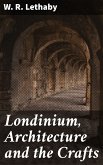In 'The Ten Books on Architecture,' Vitruvius Pollio meticulously explores the principles of architecture, intertwining practical knowledge with philosophical insights. This seminal work is notable for its structured approach, dividing its teachings into ten distinct books that cover topics ranging from materials and construction techniques to the ideal proportions and aesthetic considerations of buildings. Written in the 1st century BCE, Vitruvius's treatise stands out not only for its technical rigor but also for its literary elegance, embodying the classical spirit of Roman thought that valued knowledge, utility, and beauty in harmonious proportions. Vitruvius, a Roman architect and engineer, drew upon his extensive experience in military and civil engineering, offering a unique perspective that reflects the challenges and innovations of his time. His background in architecture, combined with the broader cultural milieu of the Roman Republic, informed his belief in architecture as a reflection of moral and civic values. This confluence of theory and practice is a testament to Vitruvius's commitment to elevating the field of architecture into a respected discipline. I wholeheartedly recommend 'The Ten Books on Architecture' not only to students and practitioners in the field but also to anyone interested in the enduring principles of design and harmony. Vitruvius'Äôs timeless insights continue to resonate, making this work essential reading for understanding the foundations of Western architecture.
Dieser Download kann aus rechtlichen Gründen nur mit Rechnungsadresse in A, B, BG, CY, CZ, D, DK, EW, E, FIN, F, GR, H, IRL, I, LT, L, LR, M, NL, PL, P, R, S, SLO, SK ausgeliefert werden.









